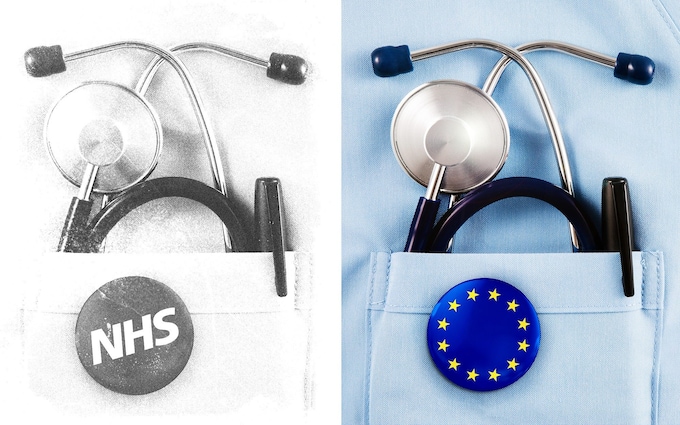
Cancer care in the UK lags 20 years behind other European countries,analysis shows.
Survival rates for prostate,bowel,breast and cervical cancer are only just reaching levels that other nations achieved in the early 2000s,according to the most recent figures available.
Experts at Macmillan Cancer Support,which produced the analysis,warned that survival rates were “stuck in the noughties”,trailing decades behind countries such as Denmark and Norway.
Improving cancer care has become a key political issue ahead of the general election,with both the Tories and Labour outlining how they plan to tackle mounting NHS backlogs as the health service struggles to meet patient treatment targets.
Earlier this week cancer survivor Wes Streeting,the shadow health secretary,told The Daily T podcast that he had considered using private healthcare after finding a new lump should the wait on the NHS be too long.

Gemma Peters,Macmillan Cancer Support’s chief executive officer,said: “Behind today’s shocking data are thousands of real people whose entire worlds have been turned upside down by cancer.
“The fact that some cancer survival rates are stuck in the noughties and are only just reaching levels that other European countries achieved in the early 2000s really hits home how far behind the UK is when it comes to cancer care.
She urged the next UK government to prioritise a long-term strategy for cancer,adding: “It’s clear that cancer care is at breaking point but this is a political choice.”
The analysis found bowel cancer survival in England for women was 20 years behind Sweden,where those diagnosed between 1997 and 2001 experienced better five-year survival rates than those in England who were diagnosed two decades later.
The survival data further shows 57.6 per cent of women diagnosed with bowel cancer in England live for at least five years,but this figure is much higher elsewhere at 72.7 per cent in Denmark,71.7 per cent in Norway and 70.6 per cent in Sweden.
Similarly,survival data from Scotland,Wales and Northern Ireland shows these countries are lagging 10 to 15 years behind Sweden and Norway.
England is currently achieving 57.6 per cent five-year bowel cancer survival rates,lower than the 73.2 per cent in Denmark,70 per cent in Norway and 69.4 per cent in Sweden.
Prostate cancer five-year survival in England currently stands at 88.5 per cent,but is much higher in Sweden at 95 per cent,94.8 per cent in Norway and 90.2 per cent in Denmark.
Breast cancer survival in England is also a decade behind Sweden and Denmark,while Scotland and Northern Ireland are a decade behind Sweden.
The data also showed that cervical cancer survival in England is 25 years behind Norway,which achieved higher survival between 1992 and 1996 than England has now.
While previous studies have shown the UK has some of the worst cancer survival rates in Europe,the analysis by Macmillan used even more recent data to give a fuller picture.
The charity said it had compared the UK to Sweden,Norway and Denmark as they have similar healthcare systems and have high-quality cancer data.
International research published in February comparing the country with Australia,Canada and Norway found the UK was worst for cancer of the stomach,lung,colon and ovaries.
The UK’s five-year-survival rate for stomach cancer was just 20.8 per cent in 2010-14. This is lower than figures other countries achieved 15 years earlier. In 1995 to 1999,Australia had survival rates of 25.7 per cent,while Canada had 21.5 per cent,with 21.3 per cent in Norway.
Earlier this year,research by University College London found that cancer patients in the UK were far less likely than people in other countries to receive chemotherapy or radiotherapy.
Studies have also found that GPs in the UK are less likely than those in other countries to investigate symptoms which could mean cancer is present.
The situation has worsened since the pandemic,when swathes of surgery were stopped,creating a backlog. Cancer operations fell more in Britain than almost anywhere else in Western Europe during 2020,international data has shown,with oncologists describing the situation as “catastrophic”.
The NHS’s key target of 85 per cent of patients given an urgent referral starting cancer treatment within 62 days has not been met since December 2015,with latest data showing just 68.7 per cent of patients seen within the time frame.
The number of cancer patients waiting at least four months to start cancer treatment has doubled in four years,NHS figures show.
Labour has pledged to double the number of scanners in hospitals,get more staff working at evenings and weekends and increase use of the private sector,as part of efforts to clear NHS waiting backlogs.
Mr Streeting said a Labour government would buy up private beds from care homes and independent hospitals for the NHS,in defiance of objections from “middle-class lefties”.
He told The Daily T this week that he had “seriously considered” going private while waiting to be referred for a scan on the NHS,saying he would put his health first if the wait was too long.
Mr Streeting said a Labour government would buy thousands of beds from care homes,to “unblock” a failing health and care system,while expanding use of private hospitals for state-funded operations.
He told an event by the Medical Journalists’ Association that there was “nothing Left-wing” about leaving working-class patients to lie in pain because of “middle-class lefty” objections to use of the private sector.
The Conservatives have committed to accelerating the NHS’s recovery from the pandemic,delivering safe and effective services and ongoing improvements in waiting times for primary,elective,cancer and emergency care.
Last year,the UK’s former cancer tsar said the NHS had spent too long “in denial” about just how bad Britain’s record on cancer was.
Prof Sir Mike Richards,now head of the UK National Screening Committee,said Britain had been lagging behind other countries for 20 or 25 years,despite repeated pledges to boost early diagnosis and survival.
An NHS spokesman said: “The NHS is seeing and treating record numbers of people for cancer,with more people diagnosed at an earlier stage than ever before,and survival rates in England at an all-time high.
“It is transforming and expanding its innovative screening programmes including lung checks in supermarket car parks,at home bowel cancer tests and using AI to spot skin cancer,making it easier than ever before to get checked,so please take up your screening invitation when asked – it could save your life.”

English Morning News: Your Source for Regional News and Corporate
© English Morning News
Privacy Policy